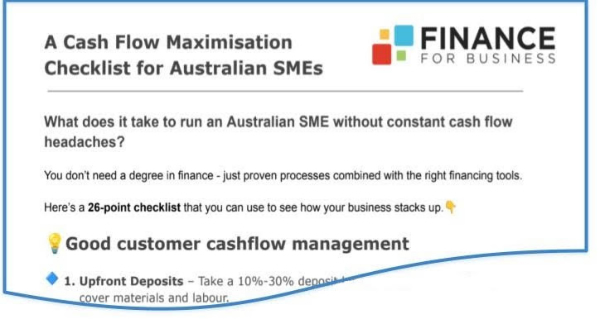I recently set up Receivables Management Finance (RMF) for a plumbing contractor in the construction industry. Overall, he was really happy with the results this smart financing tool delivered:
-
He had significantly more cash available in his business; AND
-
He was spending FAR less time chasing up customer payments.
However, in the process of setting up his finance solution, the plumber got a nasty surprise:
Three of his customers didn’t qualify for Debtor Finance. Why? Because those customers’ credit records had problems he knew nothing about.
One customer in particular shocked him: “That can’t be right! That’s my old boss – I worked for him when I was an apprentice. And he ALWAYS pays us in full on time.” But it was true – his old boss was struggling, and his business’s credit rating was down.
If my plumbing customer hadn’t taken the strategic decision to use a smart business finance product, he wouldn’t have known that he was carrying three risky debtors.
Managing your Cash Flow is a key business practice
Given the current state of the building industry, it’s not surprising that substantial, long-established businesses are struggling with cash flow.
What IS a bit surprising – given the state of the industry today – is how few construction industry businesses take the time to actively manage their business cash flow.
Running a good business is about being good at managing your cash flow – not just good at your trade.
Credit checking your existing customer base quarterly is as important as doing your BAS.
This is one of 26 simple tips for business cashflow management in my free download Cash Flow Maximisation Tips for Australian SMEs
For my plumber – as the saying goes – forewarned is forearmed. He can now take practical steps to manage the risks common to his industry.
We’re now evaluating extra funding and protection strategies for his business – strategies to help manage the risk of a key customer closing their doors. These strategies are likely to include:
- Making time for a marketing campaign to further diversifying his customer base.
- Taking out trade credit insurance – which he can get at discount rates through his Receivables Management Finance provider.
- Developing deposit and progress payment agreements for big jobs.
Are you managing your Cash Flow risks effectively?
You don’t have to be an accountant to take charge of your business cash flow. It’s simply a matter of good, practical business processes and checks – done regularly.
Test out your finance management processes using our fast free checklist: Cash Flow Maximisation Tips for Australian SMEs




